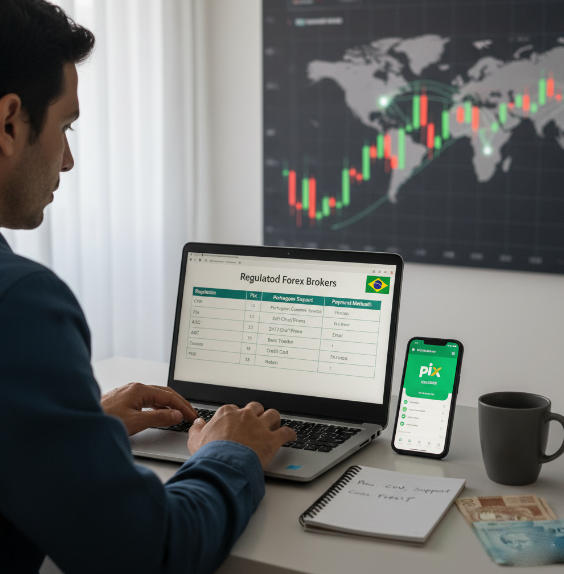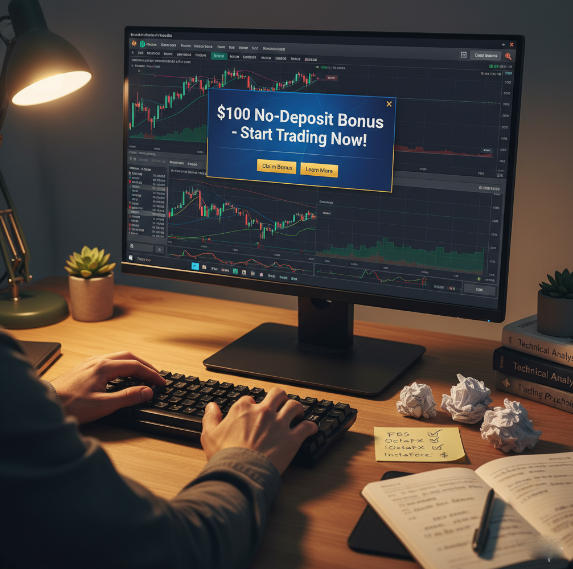Table of Contents
If you’re looking to make smart money moves this month, you’re in the right place. In this quick guide to the Best Forex Brokers for November 2025, we break down the platforms that actually deliver—fast execution, real support, and no shady fine print. With global markets shifting and promos flying left and right, picking the right broker now is like choosing the right car for a cross-country trip—you want power, comfort, and zero breakdowns.
"Regulation is your first line of defense," says Investopedia, and they're not wrong. A broker might look flashy, but if they’re not backed by top-tier regulators like ASIC or FCA, it’s a red flag bigger than a missed stop-loss.
In this guide, you'll find comparisons that matter: Pepperstone vs BlackBull Markets, MT4 vs cTrader, plus the top picks for beginners, Brazilians, and bonus hunters. No fluff—just the stuff that helps you trade smarter this month. Let’s get rolling.
Best Brokers in Brazil 2025

Brazilian traders in 2025 are demanding speed, safety, and simplicity. This cluster explores brokers tailored for the Brazilian market, covering regulation, language support, and local payments.
Regulated Forex Brokers in Brazil
Brazilian traders should never skip the fine print when choosing a broker. Look for regulation by CVM (Comissão de Valores Mobiliários) or brokers aligned with BACEN guidelines. Why? These agencies enforce legal compliance and protect your funds. Brokers under trusted financial authorities must meet strict capital requirements and disclose risk policies transparently.
Legal compliance gives peace of mind.
Foreign brokers must still comply with local investor laws.
Stay safe, stay legal. Regulation is not optional — it's the foundation.
Brazilian Brokers with Portuguese Support
Let’s be honest: trading in your native language hits different. Brokers offering Portuguese language platforms and customer support make life a lot easier — especially when you hit a snag mid-trade.
Local brokers often provide full language assistance through chat, email, and voice.
International brokers with Brazil-based support desks give you speed and familiarity.
Clear communication reduces errors, delays, and misunderstandings.
In Brazil, language isn’t just convenience — it’s strategy.
Best Local Payment Options for Trading
You want fast deposits and smooth withdrawals — nobody's got time for waiting 5 business days. Brazil’s got some killer payment methods for that:
PIX: Near-instant transfers, works 24/7, zero fees.
Boleto Bancário: Old-school but widely accepted. Good for unbanked users.
Credit/Debit Cards: Fast and flexible — especially for BRL-denominated accounts.
Local banks: Seamless integrations with major Brazilian institutions.
| Method | Speed (hrs) | BRL Support |
|---|---|---|
| PIX | 0–1 | ✅ |
| Boleto Bancário | 24–72 | ✅ |
| Credit Cards | Instant | ✅ |
Pick the option that fits your trading pace — and pocket.
Pepperstone vs BlackBull Markets
“I have traded with both,” says Marcus Viera, a senior FX analyst at FXProof Global. “What it comes down to is priorities. Some want speed, others want structure.”
Let us compare these two titans head-on.
Regulation & Trust
Pepperstone holds licenses from ASIC (Australia), FCA (UK), DFSA (Dubai), and BaFin (Germany).
BlackBull Markets is regulated by New Zealand’s FMA and Seychelles FSA.
???? Pepperstone wins on regulatory depth and global oversight.
Trading Platforms
Both brokers offer MetaTrader 4, MetaTrader 5, and cTrader. Yet, BlackBull supports TradingView integration directly.
Advanced chartists lean toward BlackBull here.
Spreads & Commissions
Pepperstone's Razor account features ultra-low spreads starting from 0.0 pips and $3.50 per side.
BlackBull’s ECN Prime delivers tight spreads, but with slightly higher commissions.
For cost-efficiency, Pepperstone stands out.
Account Types
Pepperstone offers Razor and Standard.
BlackBull offers ECN Standard, Prime, and Institutional tiers.
High-volume traders may prefer BlackBull’s custom institutional offerings.
Execution Speed
Industry tests report average execution at under 30ms for Pepperstone, ideal for scalping.
BlackBull’s co-located servers in NY4 and LD4 provide competitive speed.
Speed-sensitive strategies thrive with both, though Pepperstone has broader benchmarking.
Customer Support
User ratings across Trustpilot favor Pepperstone for prompt, multilingual assistance.
BlackBull provides dedicated account managers for Prime clients.
Retail users report a smoother experience with Pepperstone.
Deposit & Withdrawal Options
Both support bank wires, cards, and e-wallets, yet Pepperstone processes withdrawals faster in practice.
For funding flexibility, Pepperstone leads slightly.
Educational Resources
Pepperstone’s webinars and market analysis are cited by Babypips and DailyFX.
BlackBull offers beginner videos and strategy guides.
For learning depth, Pepperstone earns more praise.
Forex Bonuses November 2025

Looking to stretch your trading funds? These bonus offers can give you a head start — just make sure you read the fine print.
Top No-Deposit Bonuses Right Now
No-deposit bonuses are like a free test drive — no strings until you start winning. Here are some top picks this November:
OctaFX: $8 bonus, 1:500 leverage, MT4 platform, 30-day promotion period.
FBS: $100 bonus, moderate withdrawal conditions, low-risk entry for beginners.
InstaForex: Offers $1,000 promo (conditions apply heavily).
“No-deposit bonuses are attractive, but they’re more about platform experience than instant profits,” says Elena Hargrave, senior analyst at FXDesk360.
Make sure you always check withdrawal conditions and leverage limits.
Best Welcome Offers by Regulated Brokers
XM – Welcome bonus of up to 50% deposit match. Perfect for traders with medium trading volume goals.
AvaTrade – Regulated across multiple jurisdictions. Bonus based on deposit tiers; terms are transparent and fair.
FXTM – New user bonus + educational tools. Ideal if you're learning while trading.
These regulated brokers balance broker reputation, security, and bonus terms that won't trap your funds. Always cross-check local regulations — especially if you're outside Tier-1 regions.
Conclusion
Finding the right forex broker’s kind of like picking a gym—you need the right gear, solid support, and zero shady stuff. If you're new, go with something beginner-friendly like AvaTrade. Pros? BlackBull and Pepperstone won’t let you down on execution speed.
As Warren Buffett once said, “Risk comes from not knowing what you're doing.” Stick with regulated brokers, test the waters with a demo, and don’t fall for flashy bonuses without reading the fine print.
You’ve seen the best—now it’s your move. Start small, trade smart, and grow from there.
FAQ
It depends on the broker.
Some brokers like XM and FBS let you start trading with as little as $5, while more premium platforms like IG or Interactive Brokers may require $100 or more. The lower the minimum deposit, the easier it is for beginners to get started — but be mindful of trading costs and platform quality.
Not at all — and this is critical.
A regulated broker operates under strict financial laws and is supervised by authorities like:If a broker isn't regulated by at least one major body, your funds and data could be at serious risk. Always check the license info on their site.
FCA (UK)
ASIC (Australia)
CySEC (Cyprus)
NFA/CFTC (USA)
Spreads vary by account type and market conditions, but some brokers are well-known for consistently low spreads:
Be aware that “tight spreads” may be paired with commissions, so look at the total cost per trade.
Pepperstone (Razor Account) – 0.0 pips typical on EUR/USD
IC Markets – Competitive ECN-style spreads
Fusion Markets – Low-cost trading for active users
Tickmill – Tight spreads plus low commission options
Not all brokers offer MetaTrader 4, but most of the reputable ones do. MT4 is still the world’s most-used trading platform for forex. If MT4 matters to you, double-check before opening an account — some brokers are moving to MT5 or proprietary platforms.
Great question. Here's a breakdown:
It comes down to your style and volume. Both have pros and cons.
ECN accounts offer raw spreads + commission
Standard accounts have no commission but wider spreads
ECN is better for scalping and higher-volume trades
Standard is usually simpler for beginners
Demo accounts mimic the trading experience, but they’re not identical to live markets.
Here’s why:Use it to get comfortable with the platform and build strategies.
No real emotions involved (losses don’t hurt)
Execution might be faster than real conditions
Market depth and slippage aren’t always simulated
Still, it's a great way to practice risk-free
Yes, forex trading is legal in Brazil — but there's a catch.
Most forex brokers serving Brazilian traders are international platforms; they're not regulated by CVM (Brazil's Securities Commission). Still, using reputable offshore brokers like Pepperstone or Capital.com is common and considered safe if the broker is properly regulated elsewhere.
It depends on the broker and the account type you choose.
Here’s a quick snapshot:Always look at both spread and commission to calculate your true trading cost.
No-commission accounts: Brokers make money via wider spreads
Commission accounts (ECN): Lower spreads, but you pay per lot
Hybrid models: Some offer both options depending on trader preference
Yes, most brokers allow the use of forex signals — either manually or via automation. Some even provide their own signals. You can also connect services like TradingView, Myfxbook, or copy trading platforms.
Just remember: not all signals are reliable. Test them first, and never risk money you can’t afford to lose.

